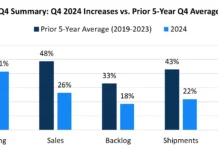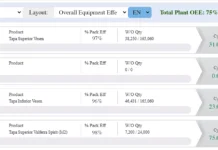by Jen Clark, Plastics Business
Tom Tredway has grown up in his family’s business – a custom injection molding company in Erie, Pennsylvania – and one day will take the helm. To prepare himself, he enlisted the help of a business mentor. While the long-term goal is to be ready when he becomes the president of Erie Molded Plastics, a series of micro goals work not only to make him a more effective businessman but also be more relaxed away from the office. “I would have likely made some of these professional strides on my own, but not as quickly and not as effectively as I did by finding the right mentor.”
Tredway’s father, Phil Tredway, founded Erie Molded Plastics in 1982. Tom Tredway worked on the shop floor through his high school and college summers. After college, he worked as a financial advisor in the DC-Baltimore area for about five years before moving back to Erie. He now is the vice president of sales and part owner of the family business. “There is a succession plan in place for me to one day own our company, and I want to put myself in the best possible position to succeed,” Tom Tredway explained. “I saw where I wanted to be five years from now, and knew that I needed to develop additional skills if I wanted to succeed. I learn a lot from the people that I work with, but I thought that a mentor would help me develop more quickly. I wanted a formal relationship with someone outside of Erie Molded who would give me advice and hold me accountable.”
In the summer of 2012, he began his search by listing the qualities he was looking for in a mentor and created an inventory of different professionals with whom he was familiar. He knew he wanted to work with someone with a manufacturing background, but the particular industry wasn’t a sticking point. After he narrowed the list to a few people, Tredway bounced those names off of a trusted advisor. When the list was whittled down to one, Tredway gave Mike Chesley, president of Erie-based Composiflex, Inc., a call. The two met and laid the groundwork for their mentoring relationship. “It was important to Mike that we (work) in a business setting,” he recalled. “He didn’t want to meet at a coffee shop or bar.”
It was important for Tredway to pick a mentor that he did not want to disappoint. “I think that’s important when seeking a mentor – choose someone who you don’t want to let down, and if you do let him/her down then he/she will hold your feet to the fire,” he said. The pair communicates on a bimonthly basis and they try to meet face-to-face every six months. The update covers the predetermined “micro” goals, which range from finances to sales processes to personal goals. “Mike writes remarks and sends the document back to me,” Tredway said. “I then propose what I’ll be working on over the next two months. From there, the cycle repeats itself. Sometimes the goals are ideas that I’ve been working on, but need some extra motivation and perspective. Sometimes he makes recommendations based on his experiences.”
So what has he learned? A lot – including how to cook.
“The lessons that have stuck with me most are the processes that I’ve implemented into my weekly routine, including managing my direct reports, sales leads, etc.,” he said. “A lot of these disciplines were born from my relationship with Mike. One of the more fun things I’ve learned is how to cook. I’ve always wanted to be more handy in kitchen, so I shared that with him and we included cooking to my bimonthly goals.”




